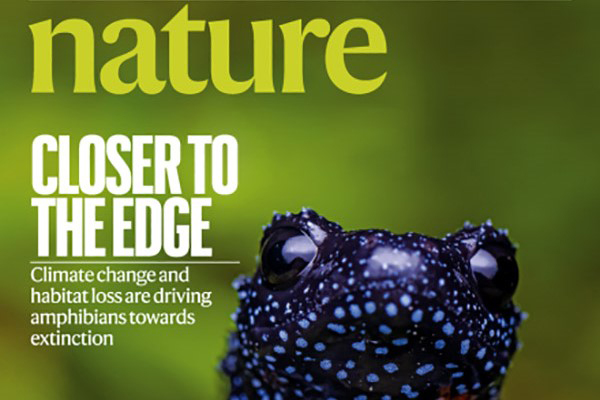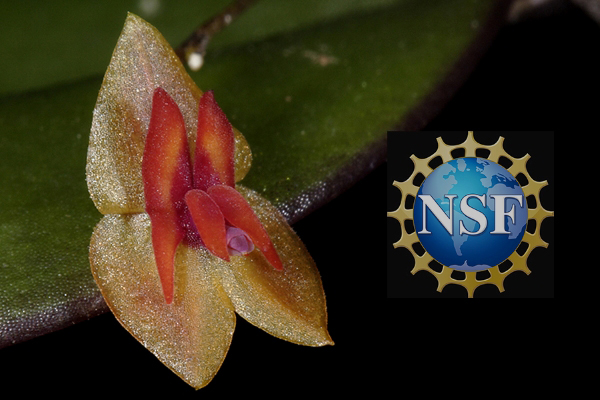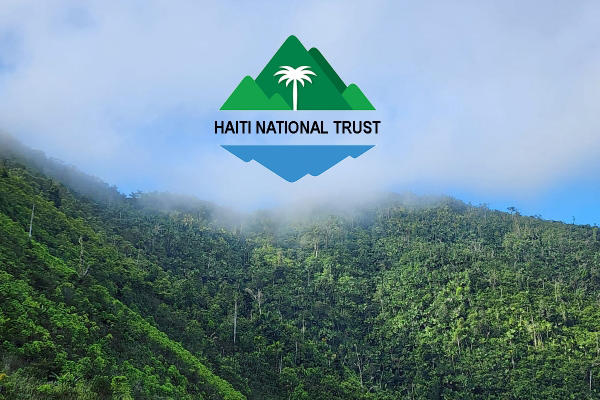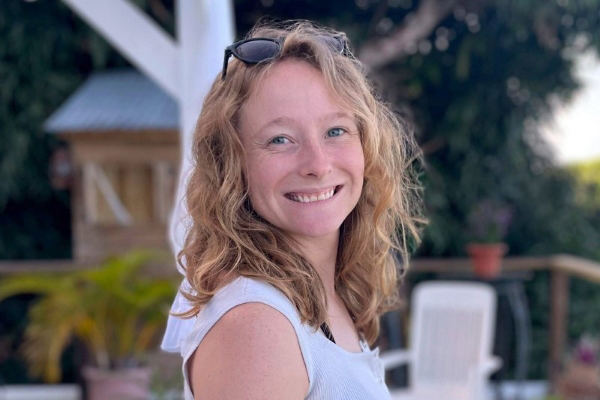Our Nature Paper Highlights Global Amphibian Threats
Posted on 4 October 2023

Today our Nature paper on
amphibians was published. The study, “Ongoing declines for the world's
amphibians in the face of emerging threats,” is based on the second global amphibian
assessment conducted by the International Union for
Conservation of Nature. The assessment evaluated the extinction risk of more than
8,000 amphibian species from all over the world, including 2,286 species evaluated for the
first time. More than 1,000 experts across the globe contributed their data and expertise,
which found that 41% of amphibians are threatened with extinction, more than any vertebrate
class. The species assessments are available on the IUCN Red List of Threatened Species. We found
that habitat loss and degradation is the greatest threat, affecting 93% of all threatened
amphibian species. Disease caused by the chytrid fungus, and overexploitation, also
continues to cause amphibian declines. These are all threats that are exacerbated by the
effects of climate change. In fact, when only the species showing an increase in extinction
risk—by moving to a higher threat category since the 2004 assessment—were considered,
climate change appeared as a substantial emerging threat. Hedges played a key role in this
study and the previous one in 2004 with his expertise on amphibians of Caribbean islands, a
region found in this analysis to have the most threatened species. This work was widely
covered in the media (NBC News, ABC News, Fox, NPR, AP, Reuters, USA Today, Washington Post,
etc.).
Nature cover photo by Sandeep Das.
NOTE ADDED: the printed
version of this article made the cover of Nature on 12 October and Leonardo DiCaprio
spotlighted it in an Instagram post.
Lab Awarded Major NSF Grant for Biodiversity Forecasting
Posted on 27 July 2023

NSF just awarded our lab a 4-year grant ($2M) for “forecasting functional biodiversity
change with satellite remote sensing and modeling.” It is from their new program
“Biodiversity on a Changing Planet” (BoCP). The grant is shared with co-PI Professor Zhe Zhu
and his group (Global Environmental Remote Sensing Laboratory) at the University of
Connecticut. Other senior researchers involved in the project are Dr. Zhiqiang Yang (USDA
Forest Service), Dr. Thomas Brooks (IUCN), and Prof. James Ackerman University of Puerto
Rico. The project will use satellite imaging and species location records in primary forests
of the Caribbean to determine which species are threatened with extinction and how their
loss will affect ecosystem function across the landscape. The outcomes will help focus
limited resources on protecting the most vulnerable and functionally important species in
these highly vulnerable areas. Biodiversity is essential for the processes that support
life, but forests are disappearing around the world, leading to a major loss of species.
This research will improve on current methods of assessing extinction risk and will map the
location of primary forest habitats, which are regions of original forest not previously
disturbed that hold the most biodiversity with the greatest number of ecological functions.
An additional outcome of the project will be to identify the most critical areas for better
protection of biodiversity.
Photo (by Eladio Fernandez): Red orchid in Macaya
National Park, Haiti.
Leonardo DiCaprio Spotlights our NGO, Haiti National Trust
Posted on 2 July 2023

In an Instagram
post today, Hollywood actor Leonardo DiCaprio called attention to new funding
received by Haiti National Trust (HNT), the non-governmental organization (NGO) in Haiti
created by Blair Hedges and Philippe Bayard. He pointed out that HNT just received
additional funding of $2 M Euros from the German agency Arbeiter-Samariter-Bund. As
explained on the
HNT web site, the aim of the new project is to strengthen the resilience of
ecosystems and communities at risk from climate change in the south of Haiti. It will
improve the governance of Grand Bois National Park through awareness and training programs.
Additionally, it will implement educational programs in schools and community centers to
educate youth on the importance of protecting the environment. The project will also
continue the crucial ecological restoration activities of HNT in the park. These activities
involve native species nursery maintenance, reforestation, and removal of invasive species,
among others. The goal is to restore the biodiversity of the park and ensure the
preservation of the environment. The project's third component is the implementation of
alternative livelihoods, which will provide sustainable economic opportunities for
communities in the buffer zone of the park. This is a significant step towards ensuring that
the park's natural resources are protected for future generations.
Photo:
view of Grand Bois National Park, Haiti.
Lab Awarded NSF Grant for Building the Timetree of Life
Posted on 10 May 2023

Molly was awarded a PhD in Biology today, on-schedule, after five years in the Hedges Lab. Her enormous (900 page+) dissertation was entitled “Evolution, systematics, biogeography, and conservation of diploglossid lizards.” She managed to make one of the most-poorly-known families of reptiles into one of the best-known families. Her three-part work involved a generic-level revision of the family published in Zootaxa in 2021, a phylogenomic analysis of historical biogeography and ecomorphs in the family published in Molecular Phylogenetics and Evolution in 2022, and a species-level taxonomic study of the major Caribbean radiation, the subfamily Celestinae. Molly will take a much-deserved (short) break before jumping into a postdoctoral position in Nebraska.
Back to Top
